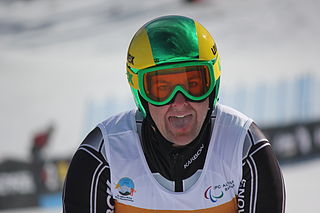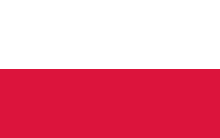
Alpine skiing at the 2002 Winter Paralympics consisted of 53 events, 34 for men and 19 for women which all took place at the Snowbasin Ski Area.

Alpine skiing at the 1988 Winter Paralympics consisted of 44 events, 29 for men and 15 for women.

The 2011 IPC Alpine Skiing World Championships was held in Sestriere, Italy, from January 14 to 23, 2011. IPC stands for International Paralympic Committee.

LW1 is a para-alpine standing skiing classification for people with severe lower extreme disabilities in both extremities. It includes both skiers with amputations and cerebral palsy. International classification is done through IPC Alpine Skiing, and national classification through local national sport federations. LW1 classified skiers use outriggers, and two skis or one ski with a prosthesis. Other equipment is used during training such as ski-tips, ski-bras, and short skis.
LW3 is a para-alpine and para-Nordic standing skiing sport class defined by the International Paralympic Committee (IPC) for skiers with a disability affecting both legs, with double below knee amputation or a combined strength total for both legs of 60, with 80 as the baseline for people without disabilities. For international skiing competitions, classification is done through IPC Alpine Skiing or IPC Nordic Skiing. The classification has two subclasses for para-alpine skiing: LW3.1 which is for people with double below the knee amputations or similar disabilities, and LW3.2 which is for people with cerebral palsy that involves moderate athetoid, moderate ataxic impairment or slight diplegic involvement.
LW4 is a para-alpine and para-Nordic standing skiing sport class defined by the International Paralympic Committee (IPC) for skiers who may have a disability in one lower extremity, which may be a result of a leg amputation below the knee, knee arthrodesis or a hip arthrodesis. For international skiing competitions, classification is done through IPC Alpine Skiing or IPC Nordic Skiing. A national federation such as Alpine Canada handles classification for domestic competitions.
LW5/7 is a standing para-alpine and para-Nordic skiing classification for skiers with upper extremity issues in both limbs that may include double amputation of both arms and hands or dysmelia of the upper limbs. The class has three subclasses defined by the location of the disability on the upper extremities. International classification is done by IPC Alpine Skiing and IPC Nordic Skiing. On the national level, classification is handled by national sports federation such as Cross-Country Canada.

LW6/8 is a para-alpine and para-Nordic standing skiing sport class, a classification defined by the International Paralympic Committee (IPC) for people with an upper extremity issue who have paralysis, motor paresis affecting one arm, a single upper arm amputation or CP8 classified cerebral palsy. LW6/8 skiers use two skis and one pole in both para-alpine and para-Nordic skiing.
LW9 is a para-alpine and para-Nordic standing skiing sport class, a classification defined by the International Paralympic Committee (IPC) for people with upper and lower limb function problems, and includes cerebral palsy skiers classified CP5, CP6 and CP7, along with people with hemiplegia or amputations. For international skiing competitions, classification is done through IPC Alpine Skiing or IPC Nordic Skiing. A national federation such as Alpine Canada handles classification for domestic competitions. This classification is separated into two subclasses including LW9.1 and LW9.2.

Poland competed at the 1994 Winter Paralympics in Lillehammer, Norway. 15 competitors from Poland won 10 medals including 2 gold, 3 silver and 5 bronze and finished 12th in the medal table.

Poland competed at the 1992 Winter Paralympics in Tignes/Albertville, France. 13 competitors from Poland won 5 medals, 2 gold and 3 bronze, and finished 10th in the medal table.

Poland competed at the 1984 Winter Paralympics in Innsbruck, Austria. 16 competitors from Poland won 13 medals and finished 9th in the medal table.

Austria competed at the 1988 Winter Paralympics in Innsbruck, Austria. 52 competitors from Austria won 44 medals including 20 gold, 10 silver and 14 bronze and finished 2nd in the medal table.

Austria competed at the 1984 Winter Paralympics in Innsbruck, Austria. 59 competitors from Austria won 70 medals including 34 gold, 19 silver and 17 bronze and finished 1st in the medal table.

The United States competed at the 1988 Winter Paralympics in Innsbruck, Austria. 45 competitors from the United States won 7 gold medals, 17 silver medal and 6 bronze medal and finished 6th in the medal table.

France competed at the 1984 Winter Paralympics in Innsbruck, Austria. 16 competitors won 6 medals, including 4 gold, 2 silver and 0 bronze. France finished 8th in the medal table.

Switzerland competed at the 1984 Winter Paralympics in Innsbruck, Austria. 50 competitors from Switzerland won 37 medals including 5 gold, 16 silver and 16 bronze and finished 7th in the medal table.

Switzerland competed at the 1988 Winter Paralympics in Innsbruck, Austria. 32 competitors from Switzerland won 23 medals including 8 gold, 7 silver and 8 bronze and finished 5th in the medal table.

France competed at the 1988 Winter Paralympics in Innsbruck, Austria. 16 competitors won 13 medals, including 5 gold, 5 silver and 3 bronze. France finished 7th in the medal table.

Finland competed at the 1984 Winter Paralympics held in Innsbruck, Austria. Thirty competitors from Finland won 34 medals, including 19 gold, 9 silver and 6 bronze medals. Finland finished 2nd in the medal table.










